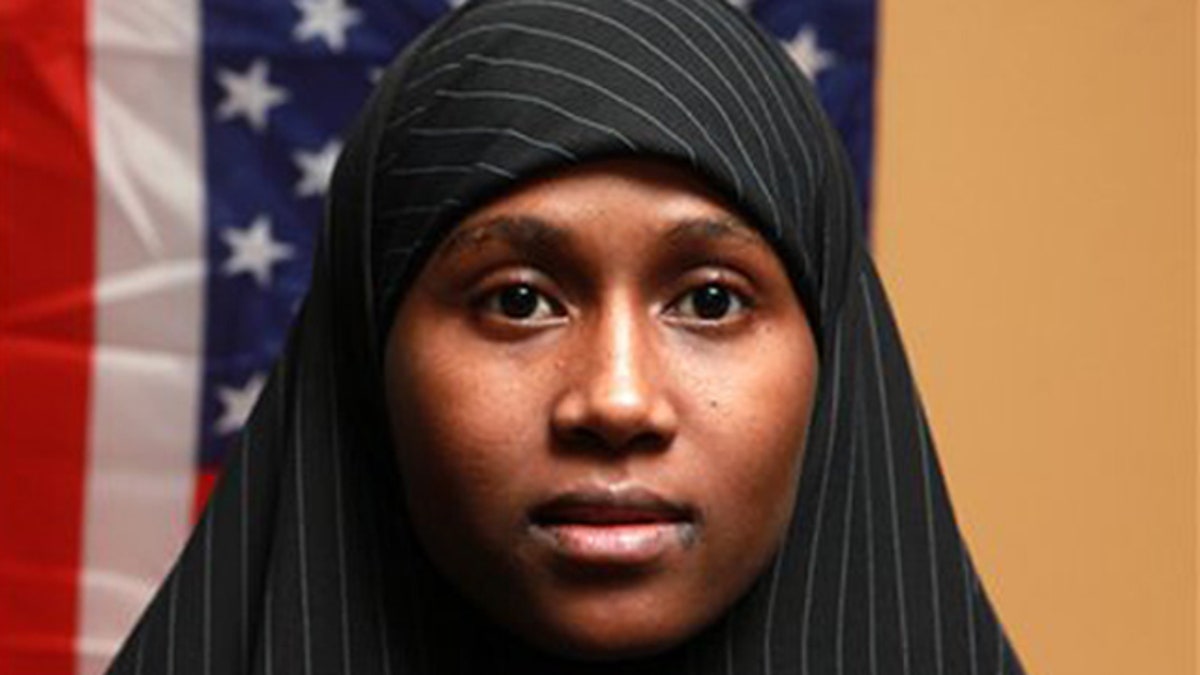
In this Thursday, Oct. 6, 2011 photo, Zainab Aweis, 20, a Somali Muslim poses in front of an American flag in Seattle, Wash. (AP/The Seattle Times)
SEATTLE – Thirty-four Muslim drivers for Hertz claimed they were suspended for praying during work hours, but the company contended they were reprimanded for abusing break times.
Backed by their union, the drivers protested Wednesday outside the Hertz counter at Seattle-Tacoma International Airport, where they are based.
"This is an outrageous assault on the rights of these workers and appears to be discriminatory based on their religious beliefs," Tracey A. Thompson, secretary-treasurer of Teamsters Local 117, said in a statement.
Observant Muslims pray five times a day.
Hertz said the workers suspended last week were violating provisions of a collective bargaining agreement and a settlement with the Equal Employment Opportunity Commission reached two years ago.
"The breaks were getting extended way beyond prayer time," said Rich Broome, a spokesman for Hertz Global Holdings Inc. "It's important to understand that several Muslim employees who are complying were not suspended. It's not about prayer, it's not about religion; it's about reasonable requirements."
Broome said employees are required to clock out to keep breaks within the 10-minute limit. Those who were suspended had not been doing so, he said.
He said managers spoke with each of the workers and posted the rule before the suspensions took place.
The union, though, said the clock-out rule was implemented without warning, adding that Hertz agreed in bargaining last year that its employees would not be required to clock out when they pray.
EEOC attorney John Stanley in Seattle declined to comment on the dispute.
"Prayer is not as other people take it," said Ileys Omar, who has been with Hertz four years and is the union's shop steward. "It's important for us, if you take prayer away, you're taking a part of our lives ... to be honest, we feel like we're being punished for praying, for being Muslim."
Omar, a 24-year-old mother of a 3-year-old and expecting a second child, said the company changed its rules suddenly. She understood that management allowed Muslims to take "mini-breaks" to pray, and didn't have to clock out.
Hertz isn't the only company that has been involved in a prayer dispute.
In 2009, a new manager at a Minnesota Wal-Mart fired a Muslim man because he prayed during his breaks, even though the previous supervisor allowed him to pray. Eventually, Wal-Mart and the Minnesota chapter of the Council on American-Islamic Relations reached an agreement to give the Muslim man another job at a store near his home. Wal-Mart said at the time that the company was "glad everyone came together to resolve the issue on a positive note."
Since 2008, Muslim workers at JBS Swift & Co. meatpacking plants in Colorado and Nebraska have been in a dispute with the company over prayer breaks, leading to several firings.
Workers alleged the company created a hostile environment for Muslims, including harassment during prayers. They had also requested that lunch breaks be modified during the holy month of Ramadan. The EEOC subsequently filed two lawsuits in 2010 that are pending. The company has said it fired workers after hundreds of them walked off the job without permission.
In Seattle, the union is trying to get Hertz drivers back on the job and has filed an unfair-labor-practices complaint with the National Labor Relations Board against Hertz for failing to notify the union in advance of what it called a policy change.
The union represents nearly 80 Hertz drivers who earn between $9.15 and $9.95 an hour. They receive no health benefits, vacation or sick leave. About 70 percent of them are Muslim.

